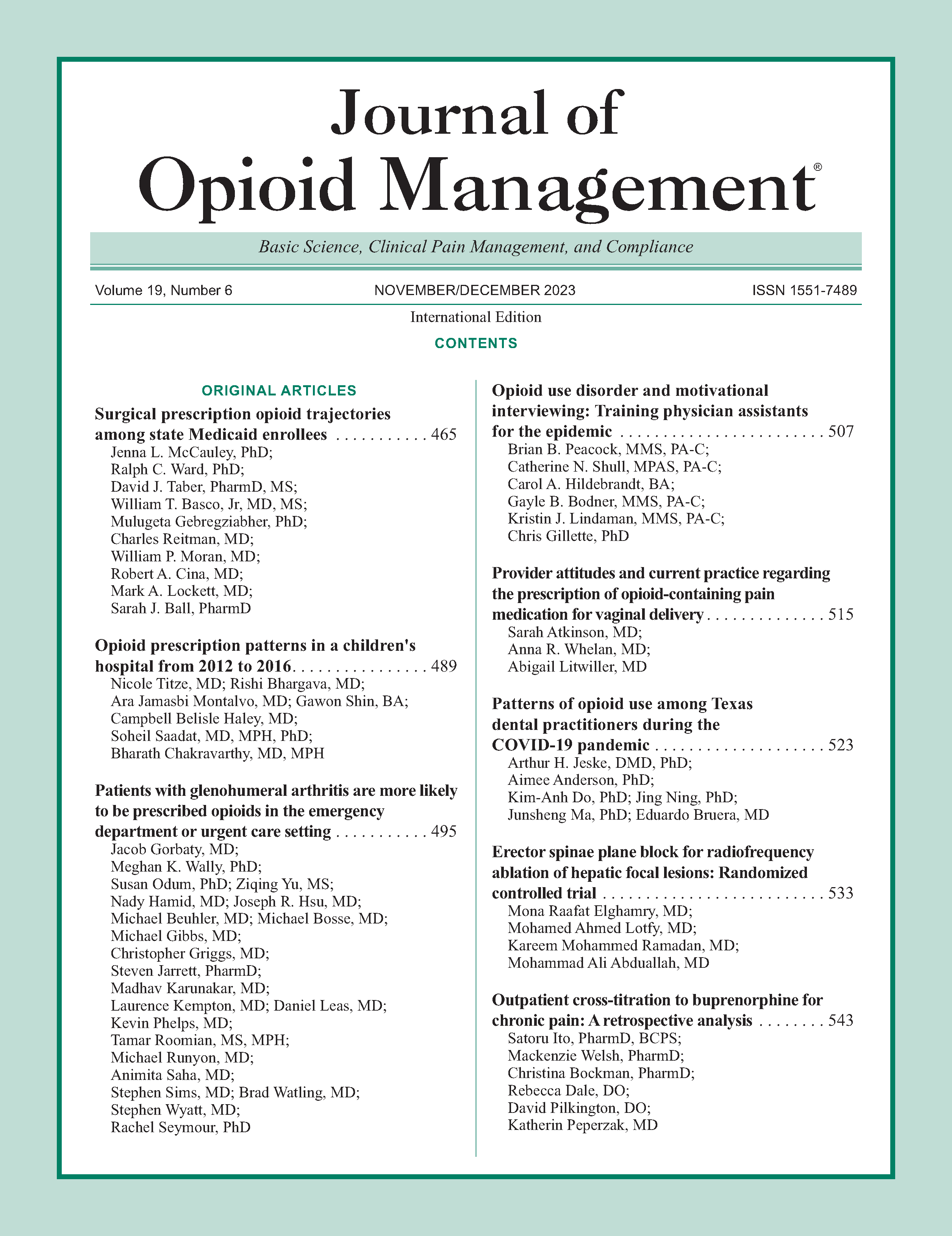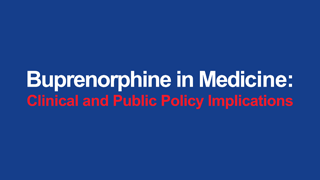Opioid use disorder and motivational interviewing: Training physician assistants for the epidemic
DOI:
https://doi.org/10.5055/jom.0835Keywords:
substance use disorders, substance dependence, prescription drug abuse, medicine, behavioral, primary healthcare, physician assistantAbstract
Objectives: (1) To evaluate the effectiveness of a curriculum on physician assistant (PA) students’ knowledge about opioid use disorder (OUD) treatment and management and (2) present student satisfaction with the curriculum.
Methods: Three cohorts of PA students completed pre- and post-intervention questionnaires about their knowledge of motivational interviewing (MI) for OUD. One cohort of students completed the 11-item questionnaire without exposure to the intervention (control group). Students’ satisfaction with the curriculum was assessed as was their pre- and post-intervention knowledge about using MI for OUD. Bivariate statistical tests were used to analyze the quantitative data.
Results: Three hundred complete and usable responses were obtained from the four cohorts of PA students (n = 300, 87.7 percent response rate). The intervention groups answered a higher number of items correctly (median = 7) than the control group (median = 6, Wilcoxon sign test M = 31, p < 0.0001). Among the intervention group, there was not a statistically significant between cohort difference on: (1) the number of identical pre- and post-intervention questionnaire items answered correctly (Chi-square = 3.77, DF = 2, p = 0.15), and (2) the total number of items answered correctly on the post-intervention questionnaire (Chi-square = 0.32, DF = 2, p = 0.85). Student comments suggest students were supportive of the curriculum, with improvements noted on how to deliver the material.
Conclusions: An educational intervention using MI for PA students was found to be valuable, and students who completed the intervention had greater knowledge about using MI with OUD patients than those who did not complete the training. The size of the effect was small, and more research on the curriculum is necessary prior to widespread adoption.
References
Centers for Disease Control and Prevention: Overdose deaths accelerating during COVID-19. December 17, 2020. Available at https://www.cdc.gov/media/releases/2020/p1218-overdosedeaths-covid-19.html. Accessed July 28, 2021.
National Institute on Drug Abuse Website: Overdose death rates. January 20, 2022. Available at https://nida.nih.gov/drugtopics/trends-statistics/overdose-death-rates. Accessed May 10, 2022.
Kaiser Family Foundation Website: Opioid overdose deaths by type of opioid. Available at https://www.kff.org/other/stateindicator/opioid-overdose-deaths-by-type-of-opioid/?currentTimeframe=1&sortModel=%7B%22colId%22:%22Location%22,%22sort%22:%22asc%22%7D. Accessed May 10, 2022.
Florence CS, Zhou C, Luo F, et al.: The economic burden of prescription opioid overdose, abuse, and dependence in the United States, 2013. Med Care. 2016; 54(10): 901-906. DOI: https://doi.org/10.1097/MLR.0000000000000625
Johns Hopkins School of Medicine Website: Opioid addiction: Signs of opioid abuse. Available at https://www.hopkinsmedicine.org/opioids/signs-of-opioid-abuse.html. Accessed July 28, 2021.
McCance-Katz EF: SAMHSA/HHS: An update on the opioid crisis. Substance Abuse and Mental Health Services Administration website. March 14, 2018. Available at https://www.samhsa.gov/sites/default/files/aatod_2018_final.pdf. Accessed July 28, 2021.
Darke S, Larney S, Farrell M: Yes, people can die from opiate withdrawal. Addiction. 2017; 112(2): 199-200. DOI: https://doi.org/10.1111/add.13512
The American Society of addiction medicine national practice guideline for the treatment of opioid use disorder: 2020 focused update. J Addict Med. 2020; 14(2S Suppl 1): 1-91. DOI: https://doi.org/10.1097/ADM.0000000000000633
Miller WR, Rollnick S: Motivational Interviewing: Helping People Change. 3rd ed. New York: Guilford Press, 2013.
Hargraves J, Frost A: Trends in Primary Care Visits. Health Care Cost Institute Website. November 15, 2018. Available at https://healthcostinstitute.org/hcci-research/trends-in-primarycare-visits. Accessed July 28, 2021.
Gillette C, Shull C, Garvick SJ, et al.: Dispensing of medications used in MAT for medicare part D beneficiaries: Impact of 2016 CARA act. J Opioid Manag. 2021; 17(7): 51-57. DOI: https://doi.org/10.5055/jom.2021.0642
NIDA CTN Common Data Elements-Instrument: Drug Abuse Screening Test (DAST-10). National Institute on Drug Abuse Website. Available at https://cde.drugabuse.gov/instrument/e9053390-ee9c-9140-e040-bb89ad433d69. Accessed May 10, 2022.
Spangler JH, Shull CN, Hildebrandt CA, et al.: Opioid use disorder and assessment of patient interactions among family medicine residents, medical students, and physician assistant students. MedEdPORTAL. 2020; 16: 11012. DOI: 10.15766/mep_2374-8265.11012. DOI: https://doi.org/10.15766/mep_2374-8265.11012
Critchlow ED, Fligner AM: On distribution-free multiple comparisons in the one-way analysis of variance. Commun Stat Theory Methods. 1991; 20(1): 127-139. DOI: https://doi.org/10.1080/03610929108830487
Yorkgitis BK, Garbas B, Cole D: Opioid prescribing education for physician assistant students: A physician assistant educator survey. J Physician Assist Educ. 2019; 30(1): 27-33. DOI: https://doi.org/10.1097/JPA.0000000000000238
Yeely JK, Martinasek M, Doran T: The current state of physician assistant pain curriculum: A national survey. J Physician Assist Educ. 2019; 30(1): 20-26. DOI: https://doi.org/10.1097/JPA.0000000000000237
McMorrow MC, Chang YP: Motivational interviewing training for advanced practice nursing students to address prescription opioid use disorder: A mixed methods approach. J Addict Nurs. 2021; 32(2): 141-151. DOI: https://doi.org/10.1097/JAN.0000000000000401
Lanken PN, Novack DH, Daetwyler C, et al.: Efficacy of an internet-based learning module and small-group debriefing on trainees’ attitudes and communications skills toward patients with substance use disorders. Acad Med. 2015; 90(3): 345-354. DOI: https://doi.org/10.1097/ACM.0000000000000506
Gillette C, Stanton RB, Anderson Jr HG: Student performance on a knowledge-based exam may predict student ability to communicate effectively with a standardized patient during an objective structured clinical examination. Curr Pharm Teach Learn. 2017; 9(2): 201-207. DOI: https://doi.org/10.1016/j.cptl.2016.11.004
Published
How to Cite
Issue
Section
License
Copyright 2005-2025, Weston Medical Publishing, LLC and Journal of Opioid Management. All Rights Reserved.











